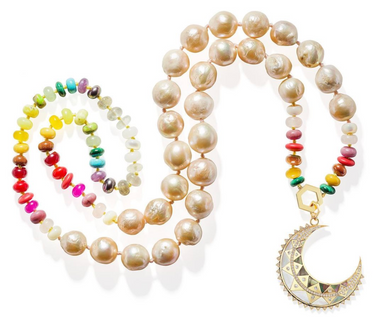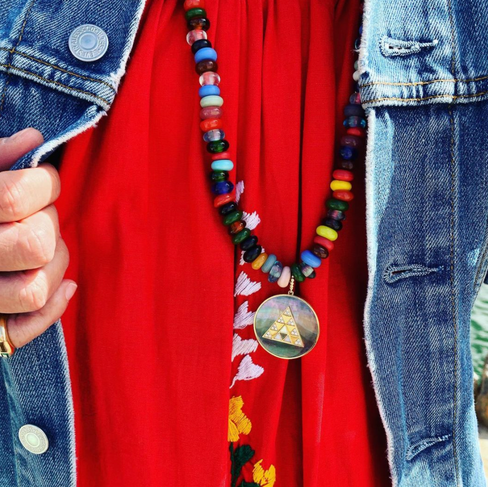Non-Linear Persistence | Lauren Godfrey
- Emily Wagner
- Oct 4, 2021
- 6 min read
Lauren Harwell Godfrey is the founder and designer of Harwell Godfrey, a bold line of fine jewelry based in the San Francisco Bay Area in California. Lauren designs her jewelry with healing energy in mind and working with ethical vendors. After meeting Lauren at an art show in San Francisco and seeing her stunning work in person I knew I wanted to profile her on Withitgirl. We are so grateful to hold this story and wisdom. Thank you Lauren! ~Asha Magee

Emily Wagner: How did you get started on your process? Your path?
Lauren Godfrey: I had a very nonlinear career path. I graduated from the University of San Francisco with a Bachelor's of Fine Arts in advertising design with an emphasis in art direction. And I went straight into the ad world and worked as an intern, and then art director, and then creative director and spent over 15 years in that industry. Funny enough, it really relates back to what I do now because I learned about creating concepts and production and project management . . . all aspects of making something even though the medium that I was working in was print ads and TV commercials. But it still is about going through a creative process to make an end result.

Emily: To put something out into the world that people are going to consume.
Lauren: Exactly! And something that has to be thought through and has some intelligence behind it. And then I think my creative muscles just wanted to flex differently, so I bounced and I went to culinary school because cooking was a real hobby of mine. After graduation, I was staging at really great restaurants like Chez Panisse, but I wasn’t really sure what I was adding to the community. Out of frustration, one day I said: "I'm going to make something that's not food today.” That thing turned out to be a belt, and I went to a leather store and asked a bunch of beginners questions and I found the process of making accessories really interesting. I have a really dear friend who has been in fine jewelry forever and has a showroom called For Future Reference, and those materials are certainly compelling to me as well. I asked if they would consider taking me on as a client and she and her business partner said, "Oh, no, don't do it. It's expensive. It's gonna be hard, you're gonna lose your mind". But I persisted. That's how I started in fine jewelry, a weird winding road. Because I'm 46 I don't have a ton of time to sit around, trying to figure it all out again, so having the support of a showroom has been invaluable.
Emily: It sounds like the common theme of your life revolves around asking other people for their wisdom, and really trusting their insight, which is really beautiful.
Lauren: I think about this a lot. I feel like it's such an interesting thing to be a human because we have this limited time on Earth and we're trying to solve all these big problems. The more we can learn from each other, it becomes accumulated knowledge, rather than just a lifetime of knowledge.
Emily: As you gain more traction, do you feel pressure to people-please? And how does that affect you?
Lauren: Part of the therapy for me is in actually doing the work and challenging myself with ideas, and having them be original. We’re all using the same materials to create fine jewelry so I’m not reinventing the wheel, so the material limitations exist, but the exciting thing is when you see someone express that material in a way that you would have never thought of.
Emily: Limitations can lead to huge inspiration! Have you ever collaborated with another designer?
Lauren: I just made an engagement ring in partnership with De Beers, via an initiative called Ten/Ten that was intended to celebrate natural diamonds that are sustainably mined in Botswana. I also created a capsule collection with sustainable mining company Muzo as part of my Cleopatra’s Vault collection — four one-of-a-kind pieces using incredible Colombian emeralds.

Emily: One of the big things that I got from your "About" section on your website is that your art ties back to ancient textile patterns. Could you talk more about the specific cultures that you connect to your work? Is it your heritage? How do you go back to culture for inspiration?
Lauren: My dad, who recently passed, was African American. He and I weren't close. So I've done a lot of digging into where we're from and who our people are, and what inspires me and makes me feel creatively motivated. I want to know more about that part of my ancestry and my heritage. And I just adore African textiles specifically. And I was also thinking, as I'm entering this world of luxury goods, who do I want to really be portraying? What do I want to say with my brand? It felt really important to me to connect to my black side. My mom is white, and I'm mixed race, but I truly felt this was a moment to connect to my Dad's side of the family through art, and through my own creative process. And so the question becomes how do I translate these ancient patterns and make them authentic to my brand, but honoring the roots?

Emily: That is interesting. I totally feel you on, like, being mixed race in America. And then, you know, America really tries to wash the non-white part of you out. I feel like it's a constant battle of reclamation. And it's often found through art, through pattern and color. When I feel the pressure to conform to whiteness, that's when I find myself going to art even more. So I really resonate with what you're saying,
Lauren: Thank you, I appreciate that. It's been a lifelong journey, Having not been close or connected to my Dad, I find myself really yearning for that connection to that part of my inner being. And so this is kind of how I'm finding it. It's been really healing. Connecting to [art through heritage] and being inspired by it and excited about and proud of it and showing it off... and saying, "here I am". Some people say, "I don't want to be known as a black so-and-so, I just want to be known as a so-and-so". And I get that for sure. But there aren't very many of us (in this industry). It's important to me to model and to show that this is a possibility for other Black, aspiring jewelry designers. That we are in the conversation. We're out there. And so to show visibly that I'm a Black designer, and to talk about it, it's become important for me to do that.
Emily: I love that. Why not reclaim all parts of your identity? Because all the parts of your identity got you to where you are.
Lauren: I completely, completely agree. I hope that someday we're in a space where it doesn't really matter anymore and everything's equal. But until that happens, I think it's important to be out there if you're comfortable.

Emily: Right! Or even, like, envisioning a future where people's identities matter to everyone and are appreciated and not seen as setbacks. Final-ish question: I understand that there are a lot of artists who struggle with not feeling worthy, which shows up and how they market themselves, how high low they set their price, or what their goals are. what's one piece of advice, someone told you, or that you wish you had heard, that you want to pass on? Today's WithItGirls and young creatives?
Lauren: I was having a conversation with a friend of mine who's a photographer, and she's said, "I realized I was pricing based on what I would pay for it based on my budget and my income. But that's not my clientele. [They have] a much larger budget". You kind of have to think about *not you* at the center of that. I think it opened me up to think bigger than I was thinking in some ways. But then I also think pricing is one of the hardest things to do because of that. Because we're so personally invested in the product, I actually rely on my showroom to help me price. What I hear happening more with my women friends than my men creative friends is "imposter syndrome” — the feeling that you're pulling one over on everyone. I think as long as we're holding ourselves to a standard of originality and quality, that means you're not an imposter. That means you're really doing it.
Emily is a withitgirl contributor who also has her own line of jewelry @stolenforms
© 2020-2021 withitgirl. All rights reserved. We appreciate your feedback!



































Comments